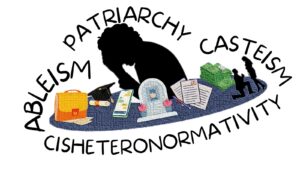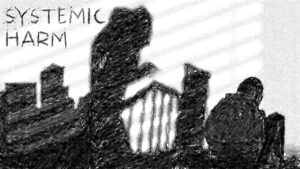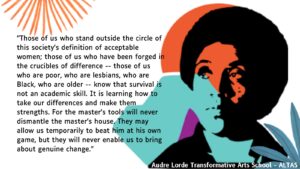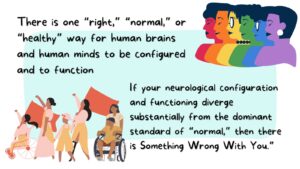The master’s tools will never dismantle the masters’ house
 So many of us live under persistent and pervasive self-doubt. Have I got this right? am I performing well enough, can I have an Instagram-able holiday, or the perfect romance, perhaps the perfect kind of a job and a package to make people proud that I am from a premier institute. Our society is stitched upon the fabric of ableism, casteist patriarchy, and cis heteronormativity to say the least. The minute we are born our physical sexual characteristics come to represent our gender and by default then our sexualities. We are meant to be measured upon the classist ableist, developmental trajectory of when we will crawl, when we will walk, when we will learn the alphabet and when we join the forces of this conveyor belt of education system that will get us somewhere. The yearning to be productive, building into a linear escalator of education, career, love, marriage, children, old age, death, it’s got to all be perfect.
So many of us live under persistent and pervasive self-doubt. Have I got this right? am I performing well enough, can I have an Instagram-able holiday, or the perfect romance, perhaps the perfect kind of a job and a package to make people proud that I am from a premier institute. Our society is stitched upon the fabric of ableism, casteist patriarchy, and cis heteronormativity to say the least. The minute we are born our physical sexual characteristics come to represent our gender and by default then our sexualities. We are meant to be measured upon the classist ableist, developmental trajectory of when we will crawl, when we will walk, when we will learn the alphabet and when we join the forces of this conveyor belt of education system that will get us somewhere. The yearning to be productive, building into a linear escalator of education, career, love, marriage, children, old age, death, it’s got to all be perfect.
Along this developmental trajectory that is set out for us, we end up believing the competition is set in favor of us. That somehow admissions to a premier institute, or the pay offs from hard work is going to take us places. Yes it does for some of us maybe but what are the costs of this hamster wheel? Who does it benefit truly?
Young Dalit and Adivasi students in tech schools and colleges speak with me about having to hide their surnames, look in vigilance when they’d be picked out of a group and bullied, harassed, or discriminated. They speak to me of incognito upper caste welcome parties in these spaces. Yes, it may never happen for some, some of the time, but it does happen for so many others. We talk about the fear in their hearts or the masking in their step, the extra work, the excess hard work, to not only do what is, but to carry a legacy of collective trauma, the guilt of survival, and the work of masking. We talk about anxiety, we talk about masking and collective trauma, we talk about survivor guilt and what it is to be human, with this incredible grief of walking along a path to achieve under the standards of productivity set forth by capitalism and ableism. This is also pathologized as depression. As if it doesn’t make sense that my body will respond to oppression with experiences of hopelessness, helplessness and sometimes even thoughts of suicide. Mental health practitioners like me, working within the frame of social justice in mental health call this systemic harm.
I speak with young and elder queers, chronically disabled trans folks, who have been ousted off this linearity, with no developmental trajectory calling us into a circle of “normality”. We speak in therapy spaces about this experience of erasure, one may be trans, lesbian, or bisexual and one is constantly having to hide queerness only to take off our masks in the solitary confinements of our homes, where a trans woman can wear her nail polish and her lipstick, or queer lovers can breathe in the joys of domesticity if there is some intersectional privilege or access. And yet, yet in these spaces where we have to perform and achieve, we experience anxiety an in ability to speak up. We are seen as incapable, our distress is interiorized, and we are labelled lazy, good for nothings. Misfits and weirdos. Western influenced. Systemic harm.
And then of course are my conversations with young folks about how their bodies and minds are experiencing the world. Our gendered world weaves a story about how assigned women and men ought to be. That women know their place, and men strive to provide. In the absence of these normative ways of being, tags like slut, whore, good for nothing, lazy, borderline PD, Bipolar, etc get met with. Systemic harm.
Poet and Black feminist Audre Lorde’s famous essay “The master’s tools will never dismantle the masters’ house” comes to mind. She writes this essay in the context of an invitation to an NYU conference where she was invited to talk about feminist theory, she reflects on the lack of representation of black queer and third world women in the dialogue. She says:
Those of us who stand outside the circle of this society’s definition of acceptable women; those of us who have been forged in the crucibles of difference — those of us who are poor, who are lesbians, who are Black, who are older — know that survival is not an academic skill. It is learning how to take our differences and make them strengths. For the master’s tools will never dismantle the master’s house. They may allow us temporarily to beat him at his own game, but they will never enable us to bring about genuine change.
 In living in a world that is overwhelmingly oppressive in its stance, one of cis heteronormative, ableist, casteist , patriarchy, I hear Audre Lordes invitation as a wakeup call to notice the Master’s tools. The masters tools in our life may be this push to excel, the grit to greatness, this need to fix our interiority and this demand to be “normal”/normative? Our shame and our self-doubt asks us to look within and see what Master’s tools we are using?
In living in a world that is overwhelmingly oppressive in its stance, one of cis heteronormative, ableist, casteist , patriarchy, I hear Audre Lordes invitation as a wakeup call to notice the Master’s tools. The masters tools in our life may be this push to excel, the grit to greatness, this need to fix our interiority and this demand to be “normal”/normative? Our shame and our self-doubt asks us to look within and see what Master’s tools we are using?
The invitation that propels me is the one to lean into our differences. The shame that shows up in our bodies is also an invitation to look with curiosity, towards what we may be valuing if not for these Master’s tools that cause this pain.
Systemic harm metes out self-doubt. It is an excellent masters tool because it makes us all perform. Makes us believe that we ought to work harder no matter that the world was crafted to keep out those us who don’t think, feel and move in the world typically. Self-doubt grows within us louder in spaces where we surround ourself with these systems, it comes with shame, self flagellation, and we give up because well it’s what these tools were meant to do. Systemic harm is also meted out through the use of pathology paradigm for the human mind. The two fundamental assumptions of this paradigm that a seminal Autistic writer Nick Walker in her book Neuroqueer Heresies offers is that
- There is one “right,” “normal,” or “healthy” way for human brains and human minds to be configured and to function.
- If your neurological configuration and functioning diverge substantially from the dominant standard of “normal,” then there is Something Wrong With You.”
But if were to lean into our differences…if we were to embrace a world that is not pathology based, not what is wrong with you but gosh, I’d love to know you more…a world where diversity among minds is a natural, healthy and valuable form of human diversity, where bodies, sexuality, castes were not to oppress but to get alive to what would we access?
In my therapy rooms and in spaces I meet people we discus systemic harm and it’s sneaky ways of being in our bodies, the ways in which anxiety, depression, helplessness, freeze, anger, grief, betrayal, loss show up. We speak to the many ways these emotions mark the direction to a North Star, to dismantle the masters house. To listen to our bodies, to get curious to the discern is it the pathologized social anxiety or the over stimulation from peoples presence and noise?
is it the interiorised pathology of OCD or the grappling of the existential temporality of life and the calling in of collective care? Is it the alienating depressive stupor or our bodies protest to systemic harm done upon us individually and collectively? Is it the suicidal ideation or the workings of the masters tool pushing us to chose death over life in the conditions presented to us? The answer is, I don’t know. My invitation is to get curious. We have for so long been riddled with self-doubt and all its close friends called guilt, shame, self-criticism and others. How can we vibilizes ourselves and others, honor pain and deconstruct the masters tools? Conversations about our bodies, minds and society is a conversation for all, and more so for those at centre of power and privilege. The lesser we access our bodies and minds to build care and compassion in the society the more we ought to work to see how the personal is political. I’d like to end with Baba Sahib Ambedkar
“A just society is that society in which ascending sense of reverence and descending sense of contempt is dissolved into the creation of a compassionate society”
If we can reach into the depths of ourselves to see whose face our hate and othering has we can begin to see the personal as political. We can being to make conversations safe to have and collectively deepen into compassion.
-Aarathi.

